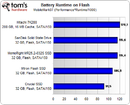- Joined
- Oct 9, 2007
- Messages
- 47,853 (7.38/day)
- Location
- Dublin, Ireland
| System Name | RBMK-1000 |
|---|---|
| Processor | AMD Ryzen 7 5700G |
| Motherboard | Gigabyte B550 AORUS Elite V2 |
| Cooling | DeepCool Gammax L240 V2 |
| Memory | 2x 16GB DDR4-3200 |
| Video Card(s) | Galax RTX 4070 Ti EX |
| Storage | Samsung 990 1TB |
| Display(s) | BenQ 1440p 60 Hz 27-inch |
| Case | Corsair Carbide 100R |
| Audio Device(s) | ASUS SupremeFX S1220A |
| Power Supply | Cooler Master MWE Gold 650W |
| Mouse | ASUS ROG Strix Impact |
| Keyboard | Gamdias Hermes E2 |
| Software | Windows 11 Pro |
And you thought your solid-state hard-drive (SSD) increased your laptop's battery life? Think again. In a new article, Tom's Hardware investigated the possibility that SSDs in fact increase power consumption of the system, and the results were astonishing.
While a conventional hard-drive idles at 0.5W to 1.3W, it's only during heavy-duty as in lots of random-access, when the actuator moves the heads back and forth that the drive could peak at up to 4W. NAND Flash based SSDs only know two power states, 'idle' and 'active', SSDs from some vendors don't even feature these. While power consumption of conventional drives are proportional to their form-factor since it affects the weight of the platter(s) and effectively the load on the motor, with SSDs, form factor doesn't affect consumption, and a 1.8" SSD could have higher idle consumption than its conventional counterpart.
You can read the article here.

View at TechPowerUp Main Site
While a conventional hard-drive idles at 0.5W to 1.3W, it's only during heavy-duty as in lots of random-access, when the actuator moves the heads back and forth that the drive could peak at up to 4W. NAND Flash based SSDs only know two power states, 'idle' and 'active', SSDs from some vendors don't even feature these. While power consumption of conventional drives are proportional to their form-factor since it affects the weight of the platter(s) and effectively the load on the motor, with SSDs, form factor doesn't affect consumption, and a 1.8" SSD could have higher idle consumption than its conventional counterpart.
You can read the article here.

View at TechPowerUp Main Site
Last edited:





